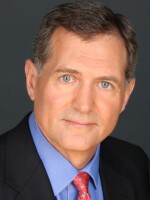SCOTT SIMON, HOST:
As we wait for coronavirus vaccines, some Americans can still recall a time when polio terrorized the country every summer. Children were hit hardest, with thousands who were paralyzed or died. Frightened parents kept their children away from swimming pools, movie theaters and other public places. Nobody knows this story better than Peter Salk. He was one of the first to receive the polio vaccine. It was discovered by his father. NPR's Greg Myre spoke with him.
GREG MYRE, BYLINE: After years of research, Dr. Jonas Salk was just beginning to test a potential polio vaccine in 1953. He brought it home from his lab at the University of Pittsburgh and injected it into his three young sons. Peter Salk was the oldest at age 9.
PETER SALK: I just hated injections. And my father came home with polio vaccine and some syringes and needles that he sterilized on the kitchen stove by boiling in water, lined us kids up and then administered the vaccine.
MYRE: He wasn't old enough to fully understand why he and his brothers were getting this shot. Yet he remembers it like no other.
P SALK: As much as I hated injections, somehow, the needle must've missed a nerve. And I didn't feel it. And so that has fixed that moment in my mind.
MYRE: That moment also marked the beginning of the end of polio. Widespread testing followed. And two years later, the government declared the vaccine safe and effective against one of the most feared diseases in the country.
P SALK: What happened in the country at that moment was remarkable. There was jubilation. There was such a sense of relief that this fear, which had been hanging over everyone's heads for years and years and years, was finally lifted.
MYRE: It's one of the great vaccine success stories. And Jonas Salk became one of the most celebrated men in America. Peter Salk is now 76 and lives in La Jolla, Calf. He's also a doctor and a part-time professor of infectious diseases at the University of Pittsburgh, the same place his father did his groundbreaking work. Salk is optimistic about a COVID vaccine. But he's been staying at home the past couple months. And he cautions against racing ahead with a vaccine that hasn't been fully tested.
P SALK: What concerns me is knowing that, in the past, there have been unexpected things that have taken place with vaccines that had not been foreseen.
MYRE: Jonas Salk worked on his vaccine for seven years before it was approved. His research was funded by charitable donations. And the journalist Edward R. Murrow asked him about a patent for his discovery.
(SOUNDBITE OF ARCHIVED RECORDING)
EDWARD R MURROW: Who owns the patent on this vaccine?
JONAS SALK: The people, I would say. There is no patent. Could you patent the sun?
MYRE: Then, as now, the need to vaccinate was urgent. But there were delays, Peter Salk recalls.
P SALK: The vaccine was introduced but haltingly. It wasn't done the way my father would have liked to have seen. Let's just get this out and get it into every single child's arms.
MYRE: At this point in our conversation, Salk picked up a book and read a passage about this period. Some in Congress were impatient, he said. At one point, a government health official was called before a Senate committee. She was asked, why was it taking so long?
P SALK: (Reading) As to her failure to anticipate the need for adequate supplies of vaccine earlier than she did, she replied heatedly, I think no one could have foreseen the public demand.
MYRE: Peter Salk says it took roughly a decade for the polio vaccine to be researched, tested and distributed widely to the American public. He hopes it'll happen much faster this time. Greg Myre, NPR News, Washington.
(SOUNDBITE OF MUSIC) Transcript provided by NPR, Copyright NPR.



